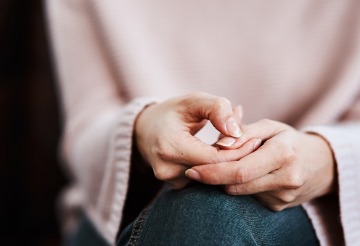

Codeine withdrawal symptoms can differ from person to person, ranging from mild to severe. Symptoms can depend on how long codeine has been taken for and the quantity of codeine taken. Codeine can also be found in prescription painkillers such as co-codamol, so similar withdrawal symptoms may be apparent when stopping taking co-codamol.
If you want to stop taking codeine, it's important to seek medical advice before you attempt to do so, to determine the best course of action for you. When you're physically dependent on codeine, you may need a medically assisted detoxification to help manage your withdrawal symptoms and any other issues that you could potentially experience during this time, such as dehydration and other health complications.
What is codeine withdrawal?
When regularly taking codeine, a person can build up a tolerance to the drug. As a result, they need to take more of it, at more frequent intervals, to experience the desired effects. For people who are physically dependent on codeine, they then need to continue taking the drug to prevent withdrawal symptoms.
If a person who's addicted to codeine tries to cut down or stop using the drug, they'll experience withdrawal symptoms as their body attempts to re-learn how to function without it.
Codeine withdrawal symptoms
Typical symptoms of codeine withdrawal can include the following:
- Runny nose and watery eyes
- Chills and goosebumps
- Difficulty sleeping
- Restlessness
- Irritability
- Loss of appetite
- Muscle twitches
People can also experience severe symptoms of codeine withdrawal such as:
- Insomnia
- Fever
- Rapid breathing
- High blood pressure
- Stomach cramps
- Nausea, vomiting and diarrhoea
- Agitation
Suicidal thoughts, psychosis and paranoid delusions can also be experienced by people withdrawing from codeine.
Acute codeine withdrawal symptoms usually begin around 12 hours after the last use of codeine, peak at around 3 to 5 days, and can last for 1 to 4 weeks.
The importance of addressing your codeine misuse and addiction
We understand that withdrawing from codeine can sound incredibly frightening. However, under our expert supervision, you'll have the opportunity to withdraw in a way that's safe, discreet and as comfortable as possible.
Our medically-assisted drug detoxification will work to reduce the impact of the withdrawal. Our teams of medical professionals are able to prescribe medication and provide specialist medical intervention if this is needed to support you through the process. Medically assisted detox can be provided through our Transform 28, Foundations 16, Flourish 14+ and Reset 7/10 addiction treatment services.
Our residential addiction treatment programme
People who go through drug detoxification at one of our Priory rehabilitation centres across the UK typically continue with our residential addiction treatment programme.
During this time, you'll take part in individual and group therapy to help you address the source of your addiction, as well as the triggers for your addictive behaviour. You'll also learn strategies for life going forward, taking real steps towards a sustainable recovery.
Pamela Roberts, Addiction Team Leader at Priory Hospital Woking says: “We work with people and their individual stories holistically. Then, together, we explore ways to develop resilience to life without having to reach for plasters, in other words, temporary relief by taking part in behaviours that have become addictions. For many this will mean abstinence.”
At Priory, we also offer day care and outpatient services, which can be an ideal step-down after a residential stay. During this time, you're able to fit codeine rehab sessions around your normal responsibilities, making sure you have continued support as you begin to navigate life in recovery.



